|
|
|
Sort Order |
|
|
|
Items / Page
|
|
|
|
|
|
|
| Srl | Item |
| 1 |
ID:
145195


|
|
|
|
|
| Summary/Abstract |
In the narrowest of terms, European security and defence are areas in which a British exit from the European Union would have comparatively little effect. Despite the launching in 19981 by France and the United Kingdom of what soon became a European Security and Defence Policy (ESDP, subsequently the Common Security and Defence Policy or CSDP),2 Britain ceased to invest politically or military in the ESDP in any substantial manner from the Iraq crisis of 2002–03 onwards. Nor has the ESDP/CSDP developed beyond a number of generally successful but quite limited operations, including the ongoing anti-piracy mission in the Indian Ocean: it has remained stuck at a low plateau ever since the economic crisis of 2008 forced other matters to the top of the EU’s agenda. The UK has pointedly disassociated itself from any broader European dimension, focusing instead on the strong and strictly bilateral relationship built with France in the field of conventional and nuclear defence since the signing of the Lancaster House treaties in 2010.3 Unlike the single market or other areas in which sovereignty is shared with the European institutions, defence and security are not caught in a complex web of intertwined national and supranational competences. There is no European omelette here to unscramble in case of a ‘Brexit’.
|
|
|
|
|
|
|
|
|
|
|
|
|
|
|
|
| 2 |
ID:
145197
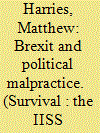

|
|
|
|
|
| Summary/Abstract |
David Cameron is a weak prime minister leading a divided government. The peculiar thing about this assertion is that it is probably more valid now than it was when Cameron was in charge of a two-party coalition, an extreme rarity in British politics. In May 2015 Cameron won an extraordinary general-election victory, becoming the first full-term incumbent prime minister since 1832 to increase his party’s share of the vote and its total number of seats in the House of Commons. He returned as prime minister having shed his coalition partners, the Liberal Democrats, who were beaten almost out of political existence. In the following months, Labour proceeded to elect as leader a veteran MP drawn from the party’s hard left, Jeremy Corbyn, who duly appointed as his shadow chancellor a backbench colleague, John McDonnell, who in 2006 had described his greatest intellectual influences as Lenin, Marx and Trotsky.1 Corbyn told the BBC he would never, under any circumstances, use Britain’s nuclear weapons – thereby breaking the taboo, based on Labour’s electoral annihilation in the 1980s, that the party should leave unilateral disarmament well alone – and McDonnell, having declared his plan for the British economy to be ‘socialism with an iPad’, quoted from Mao’s little red book on the floor of the House of Commons.2 Meanwhile, the rapid rise of the Scottish National Party north of the border had cost Labour more than 50 seats, and with the Conservatives dominant in England, there was a reasonable chance that the Labour Party would never again find itself in a position to command a parliamentary majority.
|
|
|
|
|
|
|
|
|
|
|
|
|
|
|
|
| 3 |
ID:
145194
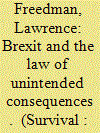

|
|
|
|
|
| Summary/Abstract |
There is no clear prospectus for a United Kingdom outside the European Union, or for an EU without the UK. ‘Brexit’ is presented as a great escape from a remote bureaucracy impervious to democratic accountability. Once liberated from Brussels, according to the Leave campaign, the nation will be able to achieve, through its energy and resourcefulness, great things that are currently beyond its grasp. What those great things might be is not specified. The Leave campaign is not a political party with a leadership and a manifesto, waiting to form an alternative government should its campaign succeed. It is a loose coalition of individuals from across the political spectrum, including free traders and protectionists, interventionists and isolationists. It is unsurprising that it has no agreed position on optimum future trading arrangements, or on how the country should engage with the rest of the world.
|
|
|
|
|
|
|
|
|
|
|
|
|
|
|
|
| 4 |
ID:
145196
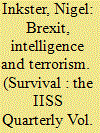

|
|
|
|
|
| Summary/Abstract |
The debate about whether the United Kingdom will be better off in or out of the European Union is driven more by emotion than by rational analysis. To the extent that rationality has played a role, it has applied to the question of which option will leave the British people economically more prosperous. But claims have also been made, by exponents of both camps, that the UK will be more or less secure outside of the EU. As with much of the ‘Brexit’ debate, such claims have been made with little in the way of factual substantiation, and the issue is, like so much else about the UK, complicated by the depth and breadth of the country’s global engagement.
|
|
|
|
|
|
|
|
|
|
|
|
|
|
|
|
| 5 |
ID:
145198
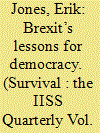

|
|
|
|
|
| Summary/Abstract |
Regardless of the result, the British referendum on European Union membership is a watershed moment. The campaign has already taught us important lessons about direct democracy, European integration and political communication. ‘Europe’ has changed as a consequence. The referendum may turn out to be a salutary experience; it may also set a destabilising precedent. We may nevertheless be wiser coming out of the process – at least in certain respects – than we were going into it.
|
|
|
|
|
|
|
|
|
|
|
|
|
|
|
|
| 6 |
ID:
145200
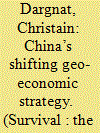

|
|
|
|
|
| Summary/Abstract |
Against an international backdrop of slowing global trade and the rise of the service industry over manufacturing, the Chinese economic model is approaching exhaustion. China is struggling to confront over-indebtedness, excess production capacity, declining competitiveness, unfavourable demographics and the flight of capital. In response, the Chinese government is adopting a change in geo-economic strategy, based on two major initiatives: a transformation of its domestic financial system, and the ‘One Belt, One Road’ (OBOR) project. The success of these initiatives will be vital to China’s economic development, political and social stability, and geopolitical emergence.
|
|
|
|
|
|
|
|
|
|
|
|
|
|
|
|
| 7 |
ID:
145206
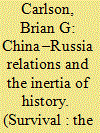

|
|
|
|
|
| Summary/Abstract |
US relations with both China and Russia have become increasingly fraught. The broad outlines of a potential great-power clash between the United States and a rising China are growing more apparent each year. Against this backdrop, a series of maritime disputes between China and its neighbours, including US allies, threaten regional stability in Asia. US–Russian relations, meanwhile, have suffered greatly from the Ukraine crisis, plunging to their lowest level since the end of the Cold War. Under these circumstances, the possibility of an anti-Western, China–Russia alliance has re-emerged with new urgency.
|
|
|
|
|
|
|
|
|
|
|
|
|
|
|
|
| 8 |
ID:
145202
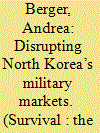

|
|
|
|
|
| Summary/Abstract |
Ugandan President Yoweri Museveni eagerly observed the April 2014 graduation ceremony of 692 newly trained recruits at the Kabalye Police Training School in Masindi. Commenting upon the occasion for journalists present, Museveni thanked the country that had so reliably provided the training assistance for the course: not the United States, Germany or Rwanda, which have all assisted the Ugandan police and defence forces in past years, but rather ‘the government of the Democratic People’s Republic of Korea [who] … always give us technical support’. ‘There are some people who are not happy with [the North Koreans]’, Museveni added, ‘but I do not see any problem with them.’
|
|
|
|
|
|
|
|
|
|
|
|
|
|
|
|
| 9 |
ID:
145204


|
|
|
|
|
| Summary/Abstract |
There is no disputing the importance of the world’s oceans for global trade, 90% of which relies on maritime routes. However, while maritime trading routes are sources of prosperity and wealth, they are also characterised by high levels of criminal activity. Trafficking in all types of goods, from drugs to weapons to people, relies on maritime transport. Illegal, unauthorised and under-reported (IUU) fishing, or the theft of fishing stocks, poses serious environmental challenges, and IUU fishing vessels are themselves useful tools for smuggling. Piracy preys on shipping and can pose serious challenges to trade.
|
|
|
|
|
|
|
|
|
|
|
|
|
|
|
|
| 10 |
ID:
145203


|
|
|
|
|
| Summary/Abstract |
The crisis over North Korea’s nuclear-weapons programme, now stretching into a third decade, is worsening. There seems little chance that North Korea will give up its arsenal absent a drastic change in circumstances. Pyongyang has repeatedly said its status as a nuclear-weapons state is permanent, even writing this into its constitution in 2012. In the minds of the North Korean people, elevating the country into the nuclear-weapons club is perhaps the greatest tangible accomplishment of the late Dear Leader, Kim Jong-il (father of current leader Kim Jong-un), as economic development foundered during his tenure. Hopes that Pyongyang might have considered its nuclear-weapons programme as a bargaining chip to be traded away for improved relations with its adversaries have largely faded.
|
|
|
|
|
|
|
|
|
|
|
|
|
|
|
|
| 11 |
ID:
145205
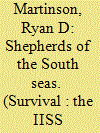

|
|
|
|
|
| Summary/Abstract |
On 21 July 2014, a Chinese law-enforcement ship, YZ 32501, arrived at its home port in Nantong, Jiangsu. As its crew disembarked, they were received by a senior officer from the China Coast Guard, who had travelled from Shanghai for the event. He thanked them for their 80 days of ‘continuous combat’ in the South China Sea.
|
|
|
|
|
|
|
|
|
|
|
|
|
|
|
|
| 12 |
ID:
145201


|
|
|
|
|
| Summary/Abstract |
In summer 2015, the United States, United Kingdom, France, Russia, China and Germany – collectively known as the P5+1 – inked a historic agreement with Iran, which obstructed Iran’s pathways to a nuclear weapon in exchange for sanctions relief. To be sure, the sanctions had taken a toll on Iran’s economy. From 2012 to 2014, macroeconomic indicators suggested Iran was in serious trouble. It would be easy to infer that global economic and financial sanctions were successful in bringing Iran to the negotiating table, a finding that would shore up perceptions of economic and financial sanctions as a cost-effective, low-risk and reproducible policy instrument. But it is important not to oversimplify sanctions’ effects. Lumping together economic (that is, trade-based) sanctions and financial sanctions tends to minimise the broader consequences of the latter. Failing to consider the range of effects that different kinds of sanctions can bring about will ultimately diminish policymakers’ capacity to deploy financial sanctions as a longer-term foreign-policy instrument. Iran’s almost complete exile from the global financial system, which encompasses both formal and informal institutions that facilitate the flow of capital for trade and investment, provides a unique case study to examine how and why institutions adapt, as well as any potential consequences of that adaptation.
|
|
|
|
|
|
|
|
|
|
|
|
|
|
|
|
| 13 |
ID:
145199
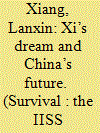

|
|
|
|
|
| Summary/Abstract |
Xi Jinping has never liked the popular Western phrase, ‘the rise of China’. He prefers China’s ‘restoration’ (fuxing) – describing an arc of recovery after the century-long free fall following the Opium Wars. Despite Xi’s ambitious project of cultural restoration, however, the People’s Republic of China is facing its most serious legitimacy crisis since its founding in 1949. At first glance this seems counter-intuitive, given that the Chinese Communist Party has pulled off one of the greatest achievements in world economic history. Yet political order based on the one-party system is under strain.
|
|
|
|
|
|
|
|
|
|
|
|
|
|
|
|
|
|
|
|
|